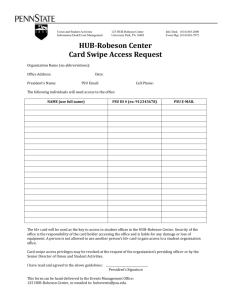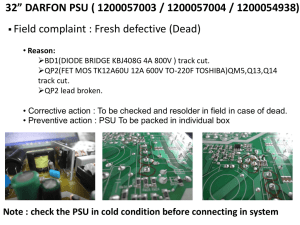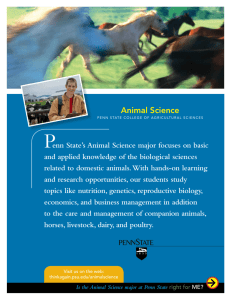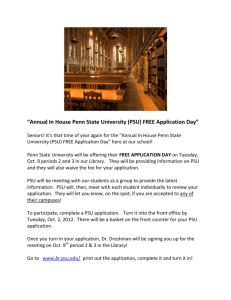The ESPRIT Rocket and Project
advertisement
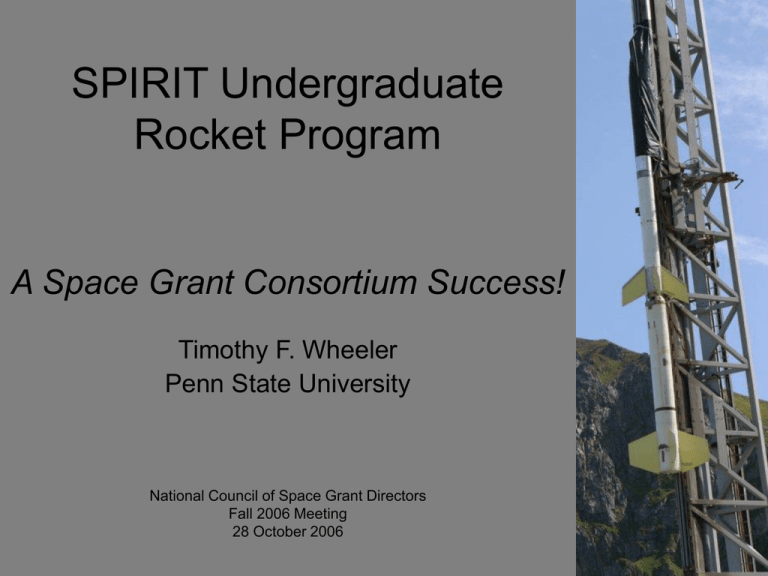
SPIRIT Undergraduate Rocket Program A Space Grant Consortium Success! Timothy F. Wheeler Penn State University National Council of Space Grant Directors Fall 2006 Meeting 28 October 2006 Outline: SPIRIT Program features ESPRIT Rocket report Role of Space Grant Consortia in SPIRIT 6 assertions (by way of conclusions) SPIRIT Undergraduate Sounding Rocket Program …Putting rockets to work for education Characteristics of a SPIRIT Payload: Long-duration, vertically integrated, collaborative small group learning environment Scientific research in service of undergraduate education Hands-on experiences related to professional development Comprehensive program of activities for students of many majors. Complex, open-ended technical challenges Besides the payload... • Companion Course (1 cr) – Evolves from lectures => working group – Team building activities (field trips to industry sites) • UN-focus on the big picture – Science tie-in – Our chance to recruit highly motivated students to space and atm science • Levering projects beyond SPIRIT – Indep. Stdy, Capstone and Honors Projects – Core curriculum ‘real-world’ problems • Publicity Campaign (w/School of Communications) • K-12 Outreach (w/School of Education) Assertion #1: Project-based courses teach students (not subjects) through active learning. Experience Learning Growth Assertion #2: Rockets provide excellent pedagogical opportunity • • • • Highly technical projects Project length fits a student career Professionalism and rigorous attention to detail required Fun and exciting! Assertion #3: SPIRIT has provided comprehensive professional development for a decade. • SPIRIT I: 17 May 2000 • SPIRIT II: 3 Oct 2004 • SPIRIT III (ESPRIT): 1 July 2006 ESPRIT: The 3rd SPIRIT project … an international collaboration Educational Goals: • Prepare the next generation of scientists and engineers for spacerelated careers • Develop the teamwork and professional skills of these particular students through complex projects • Foster a global view of man’s quest to understand the world Science Goals: • Investigate the high latitude ionosphere during a geophysically interesting period (NLC, PMSE, X-ray or particle event) • Investigate the physical characteristics of mesospheric aerosols (NLC) particles and/or PMSE conditions. Some numbers: ESPRIT: • 98 PSU undergraduates over 3 years • ~40 students in any one semester • 11 Norwegian graduate students from HiN, UiO, UiB SPIRIT: • 250 PSU participants • ~10 % women • 6 Permanent employees at WFF (1 at – Goddard) (Study of long-term effect on student careers remains to be done) ESPRIT Payload Composite nosecone & decks (PSU) Langmuir probes (PSU) 1.5m boom system (UiO/PSU) Plasma Frequency Probe (PSU) Aerosol detector (HiN) Accelerometer/Gyro exp (UiO) X-Ray det/SSD/Hor sensors (UiB) NLC detect photometer array (PSU) NLC imager/sun sensor (PSU) Pyroless door actuator (PSU) Rocket power/wiring systems (PSU) 3-axis magnetometer (PSU) TM and PCM support (PSU/ARR/FFI) ESPRIT was a success: Launched on schedule: from Norway (Andøya rakettskytefeltet) 1 July 2006 167 km apogee Excellent science conditions Preliminary assessment: -- Most instruments got usable data -- Data set will provide many opportunities for analysis by students Assertion #4: International student collaborations work to broaden understanding and build relationships for the future Student interactions • 12 Norwegians came to PSU, Feb 2005 • 2 students to ARR for HotPay launch (June 2005) • 2 PSU students to ESA Sounding Rocket Programme (Sandefjord, June 2005) •10 Norwegians to WFF, (March 2006) •2 Norwegians to WFF, (May 2006) •14 PSU students supported the launch in Andøya (June/July 2006) What now? • ESPRIT Data Analysis class (led by Dr. Philbrick at PSU) • Presentation of ESPRIT results by students – – – – – To delegation from Norway To Lockheed Martin management To PSU admininistrators To PSU CoE Research Symposium To ESA Sumposium, June 07? • Establishment of a Student Space Projects Lab at PSU with Space Studies Certificate (Dr. Sven Bilén) Assertion #5: ESPRIT will meet its educational and scientific goals. ESPRIT has been a fun and effective international collaboration NB: This is not a live booster! Assertion #6: Space Grant Consortia can have a fundamental role in nurturing forward-looking educational agendas • Role of PA Space Grant Consortium in SPIRIT: – First ’enabler’, funded a promising idea. – Subsequent ’sustainer’ role for operational funds as seed money – Network for collaboration, contacts • Role of SPIRIT in PA Space Grant Consortium: – Provided an avenue to address the very goals Dr. Winterton highlighted – Provided a technical ’edge’ to PA SGC programs – Provided concrete successes at regular intervals – Provided ready resource for outreach activities related to rockets Our success is your success – Thank you! Summary of Assertions: 1. Project-based courses teach students (not subjects) through active learning. 2. Rockets represent an excellent pedagogical tool ! 3. SPIRIT has provided comprehensive professional development for a decade. 4. ESPRIT (SPIRIT III) will meet its educational and scientific goals. 5. International student collaborations work to broaden understanding and build relationships for the future 6. Space Grant Consortia have a fundamental role to play in nurturing forward-looking educational agendas Collaborating Faculty on ESPRIT • Penn State University – Dr. Sven Bilén – Dr. Russell Philbrick – Dr. David Spencer – Timothy F. Wheeler (tfw1@psu.edu) • Universitet i Oslo – Dr. Torfinn Lindem • Universitet i Bergen – Dr. Johan Stansnes – Svein Njastaad • PA Space Grant – Dr. Lisa Brown • Andøya Rakettskyltefelt – Dr. Evind Thrane – Jorgen Ilstad • NASA/NSROC – Philip Eberspeaker – Bruce Scott, mgr • Høyskolen i Narvik – Dr Arne Bjørk http://spirit.ee.psu.edu Sponsors of ESPRIT: • PA Space Grant Consortium • • NASA Wallops Flight Facility Andøya Rakettskyltefeltet • • Penn State College of Engineering Corporate Sponsors: Lockheed Martin Boeing YLA Composites Olympic Machining • Thanks also to the U.S. Embassy in Oslo for support of student travel Visit our web site at: http://spirit.ee.psu.edu

